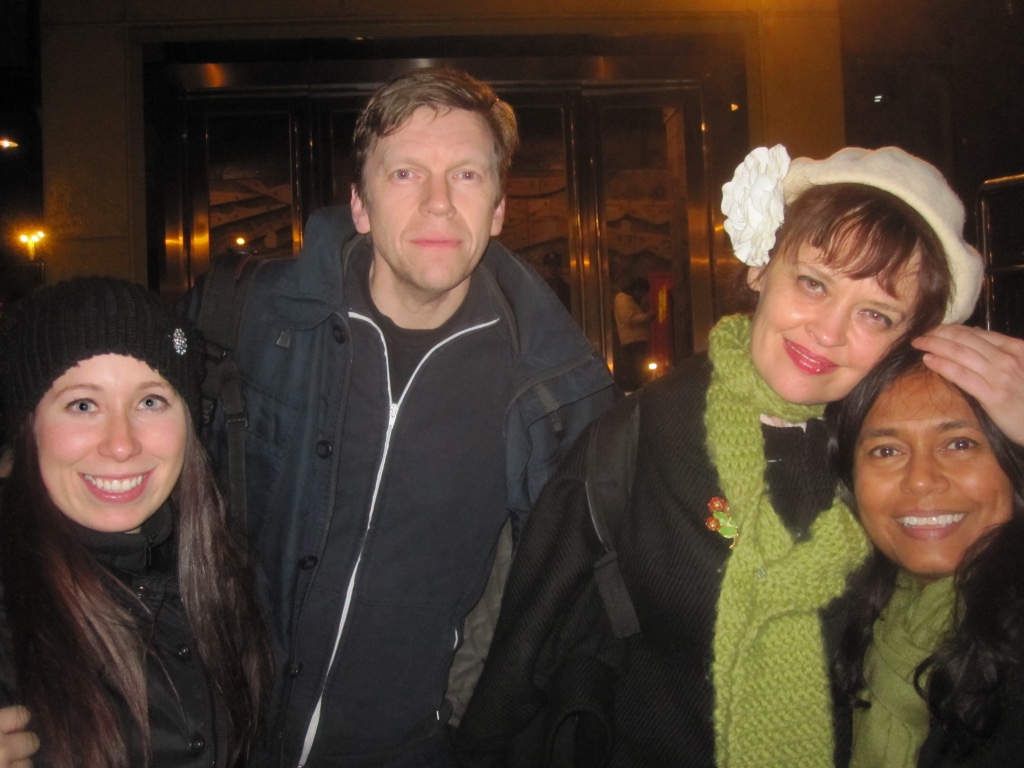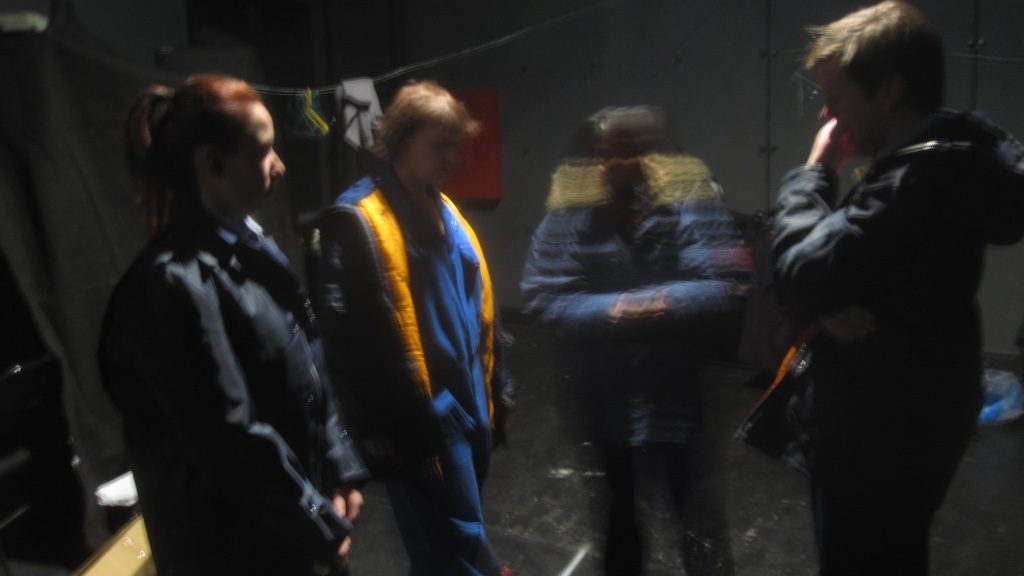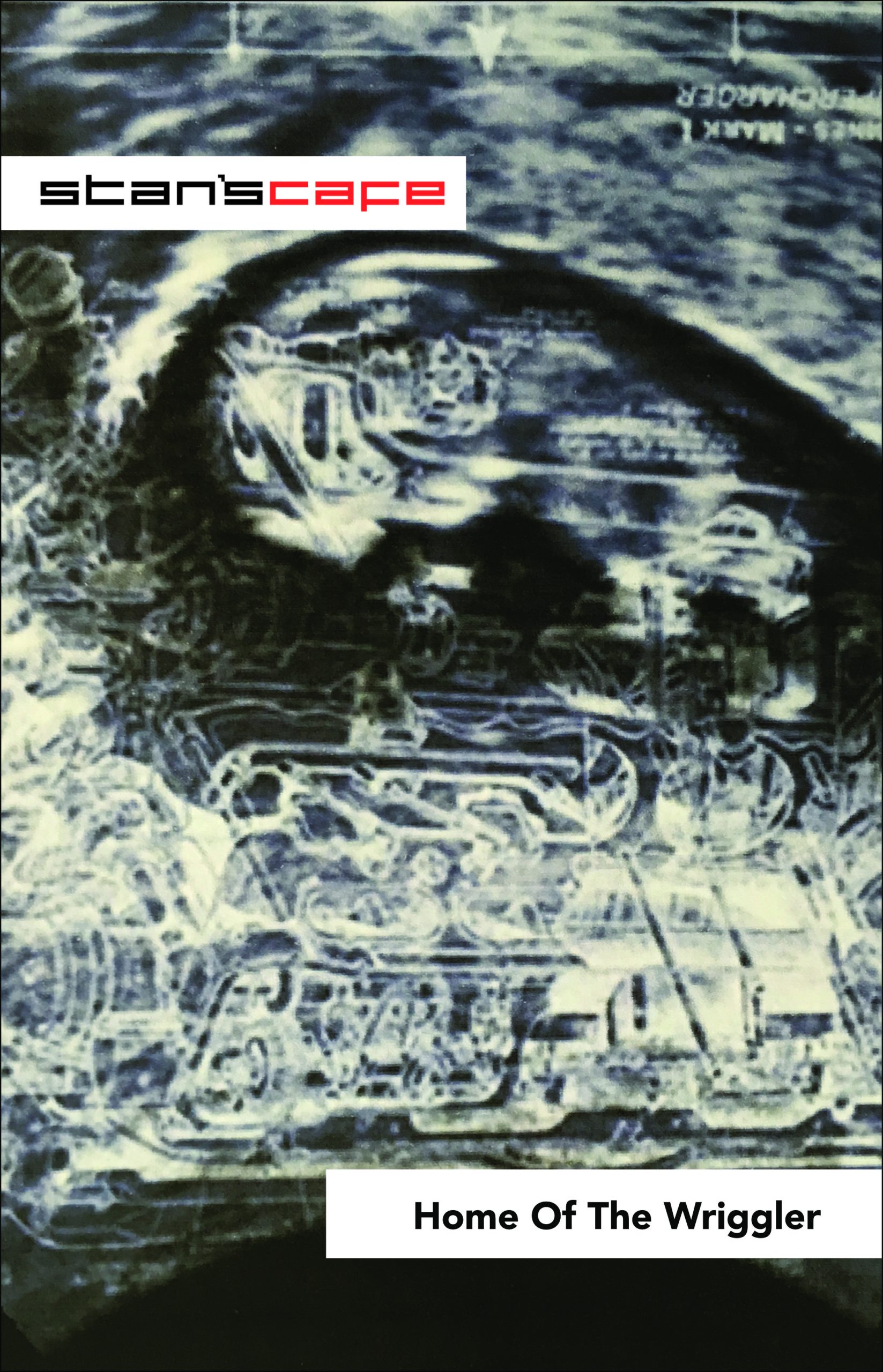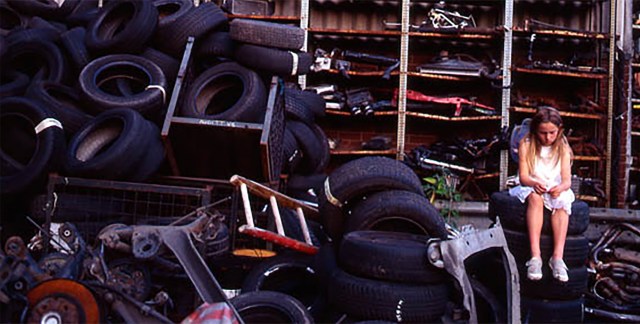
Home of The Wriggler is a lo-fi sci-fi docu-drama:
Lo-fi because the lights and sound are all powered by the cast, givingthe show a strange intensity and immediacy.
Sci-fi because the show is set at some indeterminate future time when the Rover brand, the Longbridge plant and cars in general have become the subject of myth and speculation.
Docu-drama because the show is founded on interviews, anecdotes, personal experiences and documents about living, working, growing-up, fallingin love, making/buying/selling/driving/sitting in cars in Birmingham.
Home Of The Wriggler is based on a host of entangled and fractured stories told in the pulsing beams of car headlights. An exploded view of a car’s transmission system serves as a backdrop. Names of the show’s 87 strongfictional cast replace car components. Four actors, dressed down in workwear and parka coats, drive the show on. An exercise bike and twelve speed racer have been customised with dynamos and switches to runseven lights, a kettle and a home-made turntable. Stories leap back and forth through time and across the globe. A hand-cranked flywheel powers four more lights mounted on stands, chest-high as if microphones. A barrage of names and relationships become impossible to follow only to later come backinto focus. Shake-to-shine torches help navigate. Scenes are emotive, detailed and boiled down, full of local colour and global import. An wind-up phone chargerpowers a single blue LED. An eco-legend is told. Action is simultaneously tenderand distant. A few bars of Phil Collins’ eighties hit Another Day In Paradiseare picked by a punch card running through a miniature musical box.
The show is written out of love and fury. The cast sayit is the most demanding show they have ever had to perform.
“A Vibrant College of stories… mines the miraculous that is part of even the most ordinary life”
The Scotsman
“Home of the wriggler… is a clever, entertaining and ultimately moving piece of theatre”
The Sunday Times
Tour Dates
-
29th February, 2020
Cornerstone, Didcot -
27th February, 2020
Arena Theatre, Wolverhampton -
26th February, 2020
Warwick Arts Centre, Coventry -
24nd February, 2020
University of Worcester -
20th – 22nd February, 2020
The REP, Birmingham -
24th – 27th November, 2010
Theatre 9, Beijing -
29th April, 2010
Merlin Theatre, Frome -
28th April, 2010
Dartington -
20th – 24th April, 2010
The Drum, Plymouth -
9th & 10th April, 2010
Ustinov Studio, Bath -
8th April, 2010
@ A E Harris, Birmingham -
16th – 31st August, 2009
Underbelly, Edinburgh -
13th August, 2009
@ A E Harris, Birmingham -
18th & 19th May, 2009
BAC, London -
14th & 15th May, 2009
The Tobacco Factory, Bristol -
12th & 13th May, 2009
Nuffield Theatre, Southampton -
23rd – 25th April, 2009
@ A E Harris, Birmingham -
22nd April, 2009
Studio Theatre, Chichester -
3rd April, 2009
Prema Arts Centre, Uley -
2nd April, 2009
Gulbenkian Theatre, Canterbury -
1st April, 2009
@ A E Harris, Birmingham -
1st & 2nd February, 2006
Warwick Arts Centre, Coventry -
25th – 27th January, 2006
mac, Birmingham





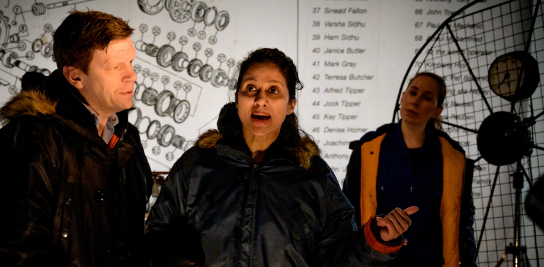








Credits
Home of the Wriggler was provoked by the passion unleashed in Birmingham when BMW announced it was looking to dispose of MG Rover. It was to have been a documentary about a working factory but events caught up with us; Longbridge closed within a month of our first research visit. It would have been easy to make this show nostalgic or a requiem for the plant, but it’s not our history to be that intimate with, so we have tried to steer clear of sepia images.
This show doesn’t attempt to tell the story of Rover. Instead it tells dozens of human stories, some very short, some entangled, others standing alone; all start after their beginning and finish before their end, missing out much in the middle. No one is expected to follow all the show’s strands, but we hope that in the collage of all these small stories elements of that big story will emerge.
Although most of the material in Home of the Wriggler arises from stories we have been told, these sources have been mixed, mashed and re-imagined so that any resemblance to any characters living or dead should be considered un/happy chance.
The show contains a small amount of ‘industrial language’ and due to vagaries of pedal power, lighting levels will fluctuate in a mild strobing effect.
Devised by
Heather Burton
Amanda Hadingue
Bernadette Russell
Craig Stephens
James Yarker
Performed by
Heather Burton
Amanda Hadingue
Bernadette Russell
Craig Stephens
Text
James Yarker
Devices, design and costume by
Mark Anderson and Helen Ingham from Blissbody
Thanks to
MCD for rehearsal space
Michael Martin, Walter Suett, Tony Williams and others we know for fragments of their stories
Constance Dimsdale for her patience
The Stan’s Cafe Board: Rob Elkington, Syd Ewart, Peter Fletcher,
Gerv Havil, Andy Parsons, Sadie Plant, Heather Taylor
Production Manager: Karen Stafford
Photography: Ed Dimsdale
Graphic Design: Simon Ford
General Manager: Charlotte Martin
Advisory Producer: Nick Sweeting
Education Department: Graeme Rose & Ana Rutter
This show is dedicated to Archie, Eve, Jacob, Robin and their future friends.
This Project was funded by Urban Fusion
Bharti Patel replaced Bernadette Russell for various touring dates up until 2020.
Amy Ann Haigh replaced Amanda Hadingue in Beijing.
2020 Tour Cast
Amy Ann Haigh
Carys Jones
Hema Mangoo
Craig Stephens
Executive Producer: Roisin Caffrey
General Manager: Chris Pette
Photographs: Graeme Braidwood
Thirty years ago the collapse of Rover might have been expected to inspire a political documentary along the lines of David Edgar’s Events Following the Closure of A Motorcycle Factory, still my award winner for theatre’s least commercial title.
Instead, Birmingham theatre experimentalists Stan’s Cafe have come up with something more gentle and poetic, though in its way certainly no less powerful.
It does begin with a documentary approach, in that it is based on interviews with Longbridge workers and their families, but these are used to produce a kaleidoscopic collage of impressionistic fragments which evoke the lives of generations touched by the manufacture and use of motor cars.
These are presented by four performers amidst a seemingly random assortment of post-industrial clutter.
The backdrop is an exploded diagram of a car transmission in which the names of parts in the numbered guide have been replaced by names of people – presumably the interviewees
In a clever image of some future de-powered age, the distinctly low-key lighting is apparently powered by the performers peddling bicycles or cranking other low-tech devices.
Looking back from some distant historic perspective the narrative can sweep across wide expanses of time and space, casting glances back to Herbert Austin setting up his factory at the foot of the Lickeys or across to a Chinese docker unloading a consignment of machine tools plundered from Birmingham.
But the main focus is on the recent history of Longbridge, the fine grain of ordinary lives and the strategies of small but real people to dodge the tsunami of economic change.
All this is delivered with a kind of cheery stoicism and a lot of humour, which makes it an easy show to like.
However, with its large cast of characters and fragmented narrative lines, I found I struggled to remember who was who, with a lot of intricate cross-referencing passing by only partially registered.
Home of the Wriggler (the title, by the way refers to a child who plays a pivotal role in the show’s long historic view) is a clever, entertaining and ultimately moving piece of theatre.
I liked the way so much Birmingham trivia is captured in it, seemingly by chance, like flies in amber – a truly archaeological piece of theatre.
Terry Grimley, The Birmingham Post, 27 January 2006


